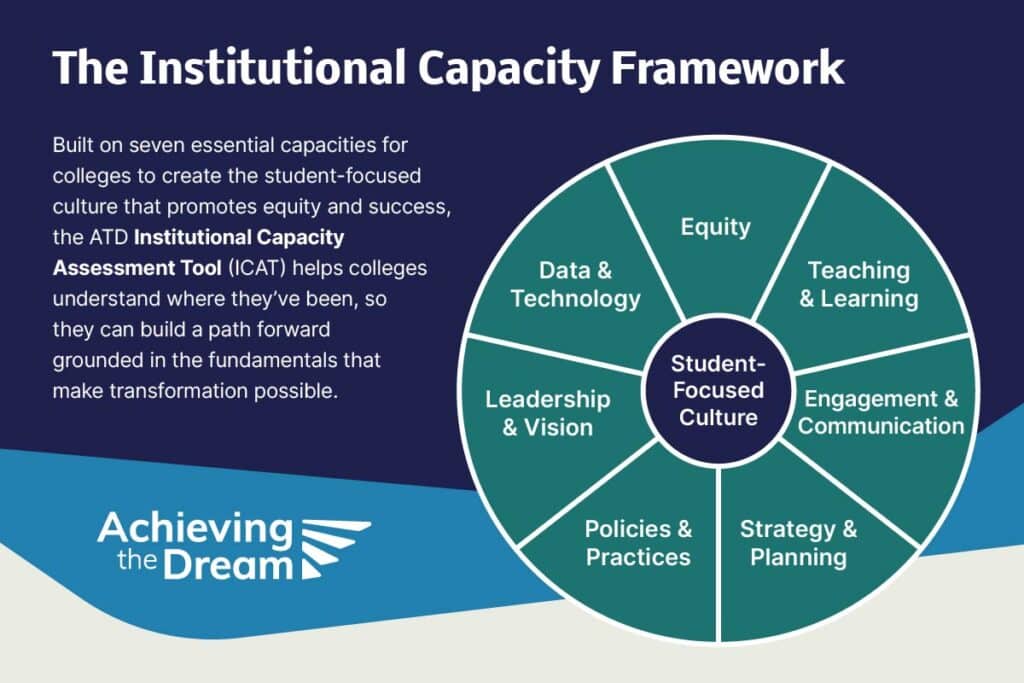When Leech Lake Tribal College (LLTC) joined the ATD Network in 2017, team members used Achieving the Dream’s Institutional Capacity & Assessment Tool (ICAT) to assess strengths and opportunities for growth. Across the ATD Network, college teams use their ICAT results to inform future work, leveraging data and analysis to operationalize strategies to drive improved outcomes for students.
In 2020, LLTC retook the ICAT and compared their results to those from the 2017 assessment. The results showed marked improvements across the institution — five of seven capacity areas had improved, and the comparison analysis prompted the college to ramp up strategic efforts to support community vitality.
Two leaders from LLTC spoke to ATD about the leadership strategies and cultural changes that contributed to the college’s improved ICAT results, from a culture of evidence to community engagement.
Strengths in teaching, strategy, and data
Jorge Mendoza, dean of student services and deputy Title IX coordinator, says that while the 2020 ICAT results showed improvements in most areas, the categories where LLTC showed particular development were teaching and learning, strategic planning, and data and technology.
COVID-19 resulted in a “forced adaptation to distance learning,” Mendoza said. He noted that while the pandemic posed plenty of obstacles to LLTC, as it did at every college, his team learned to “use it as a catalyst.” Distance learning modules that the college had once been “timid” to adapt were prioritized and quickly implemented to ensure the college could continue delivering a high-quality education to its students. The college developed a distance learning orientation for all students and supported faculty with nationally recognized professional development in distance learning methods for student success. Since the beginning of the pandemic, LLTC has minimized barriers for distance learning with 200 computers purchased for students and 60 hot spots for internet established. Now all classrooms can accommodate in-person and virtual learning for hybrid flexible (HyFlex) as well as online instruction.
But this catalyst of distance learning was only a small piece of LLTC’s broader institutional transformation: The college’s 2020 ICAT also showed significant growth in the area of strategic planning, and the pandemic struck just as college leadership were completing a thorough, intentional strategic planning process that began with a comprehensive community survey. Dr. Helen Zaikina-Montgomery, president of LLTC, talked about the importance of gathering input from across the college. The strategic planning committee developed a comprehensive plan that included contributions “from every component that touches the college,” Dr. Zaikina-Montgomery said. “Community, faculty, staff, students — everyone had a chance to have input.” Now the Strategic Planning Committee is broadly representative and will meet weekly to verify progress made with the LLTC strategic plan and to communicate results.
The use of data has also been integral to LLTC’s student success efforts. Addressing a top faculty concern, the college conducted an analysis of student absenteeism. Weekly attendance reports distributed by IT helped faculty better understand when students were dropping classes and showed patterns of stress through attendance. Since faculty have shared these results, there has been steady improvement in the number of credits earned vs. credits attempted. Attendance increased from 49 percent of students attending regularly in 2021 to 66 percent in 2022.
Continuing to grow
Strategic planning, data and analytics, and teaching and learning have been identified as areas of increased strength at LLTC, and the college is now focusing on additional areas for improvement based on opportunities for growth revealed in the ICAT. These areas, including engagement and communications as well as policies and practices, are emphasized in the college’s strategic plan.
Following a period of high turnover among staff and leadership, Mendoza said that “hiring the right personnel” is key to ensuring that existing policies and practices are better implemented and maintained. The college is also working to develop a wage scale for all employees — staff and faculty included — that reflects the full scope of their duties and adjusts for cost of living, something Dr. Zaikina-Montgomery said was especially important as the institution works to increase employee retention during a period of high inflation nationwide.
To increase community engagement, the college is working with community partners on multiple efforts, including workforce development initiatives with the Leech Lake Band of Ojibwe and collaborating on local food systems. “One of the more exciting things that we’re working on,” Dr. Zaikina-Montgomery said, “is to look at building a roundhouse, which is a ceremonial building for cultural events, on the campus of LLTC.”
Data as a constant practice
President Zaikina-Montgomery’s previous position at the college was director of assessment and institutional research, so data is important to her. That’s why she places such a high value on the ICAT and made sure the seven capacities were incorporated in the strategic plan.
The ICAT format and ATD’s support “have been great for us to get ahold of that data in a fairly painless way,” she said. “All we have to do is answer the questions. I don’t have to sort through these data, or visualize or interpret them. It’s all done for me. I hope we get to take the ICAT again in another year, because I would like to track and see what the data are doing.”
Achieving the Dream works with Leech Lake Tribal Colleges as well as 32 other Tribal Colleges and Universities through Project Success, an initiative administered by Ascendium Education Group on behalf of its partners and the U.S. Department of Education.
